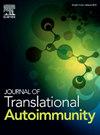Leucine enhances the cGAS-STING-NLRP3 pathway in autoimmune thyroiditis
IF 3.6
Q2 IMMUNOLOGY
引用次数: 0
Abstract
Background
Branched-chain amino acids (BCAAs), including isoleucine (Ile), leucine (Leu), and valine (Val), are substrates for synthesising nitrogenous compounds and signalling molecules involved in regulating immunity. To date, data on the role of BCAAs in autoimmune thyroiditis (AIT) are lacking; therefore, this study aimed to determine the causality using two-sample Mendelian randomisation (MR) and explored the role of BCAAs in the cGAS-STING-NLRP3 pathway in vitro.
Methods
The causal relationship between BCAAs and the pathogenesis of AIT were identified using a two-sample MR study. The anti-inflammatory effects of BCAAs and their role in the cGAS-STING-NLRP3 pathway were investigated in lipopolysaccharide (LPS)- induced thyroid follicular cells (TFCs).
Results
Our findings indicate that BCAAs are a pathogenic factor for AIT (IVW OR = 4.960; 95 % CI = (1.54,15.940); P = 0.007). Leu significantly exacerbated the inflammatory response of thyroid cells, as evidenced by the up-regulation of tumour necrosis factor-alpha (TNF-α) and interleukin (IL)-6 and down-regulation of TGF-β1; simultaneously aggravated cellular injury and oxidative stress; significantly increased the expression of Sestrin2/p-mTOR and cGAS/STING/NLRP3 in AIT cells. Furthermore, the expression of IL-18 and IL-1β was significantly increased. Conversely, Leu deprivation induced cell injury, decreased oxidative stress, and inhibited Sestrin2/p-mTOR and cGAS/STING/NLRP3 pathways.
Conclusion
Our findings suggest a potential causal effect of genetically predicted Leu on AIT; Leu significantly exacerbated the inflammatory response and cellular damage in AIT cells. The mechanism by which Leu induces inflammation involves activating the promoted Sestrin2/mTOR and cGAS-STING-NLRP3 signalling pathways. Our study proposes a novel mechanism for the contributions of Leu in AIT and potential therapeutic strategies involving Leu deprivation in treating AIT.

亮氨酸增强自身免疫性甲状腺炎cGAS-STING-NLRP3通路
支链氨基酸(BCAAs),包括异亮氨酸(Ile)、亮氨酸(Leu)和缬氨酸(Val),是合成含氮化合物和参与调节免疫的信号分子的底物。迄今为止,缺乏关于支链氨基酸在自身免疫性甲状腺炎(AIT)中的作用的数据;因此,本研究旨在通过双样本孟德尔随机化(MR)来确定两者之间的因果关系,并探讨BCAAs在体外cGAS-STING-NLRP3通路中的作用。方法采用双样本磁共振分析方法,探讨支链氨基酸与AIT发病机制之间的因果关系。在脂多糖(LPS)诱导的甲状腺滤泡细胞(tfc)中,研究了BCAAs的抗炎作用及其在cGAS-STING-NLRP3通路中的作用。结果BCAAs是AIT的致病因素(IVW OR = 4.960;95% ci = (1.54,15.940);p = 0.007)。亮氨酸显著加重甲状腺细胞的炎症反应,表现为肿瘤坏死因子-α (TNF-α)、白细胞介素-6上调,TGF-β1下调;同时加重细胞损伤和氧化应激;显著增加AIT细胞中Sestrin2/p-mTOR和cGAS/STING/NLRP3的表达。IL-18和IL-1β的表达显著升高。相反,Leu剥夺诱导细胞损伤,降低氧化应激,抑制Sestrin2/p-mTOR和cGAS/STING/NLRP3通路。结论基因预测的Leu对AIT有潜在的因果影响;Leu显著加重了AIT细胞的炎症反应和细胞损伤。Leu诱导炎症的机制涉及激活被促进的Sestrin2/mTOR和cGAS-STING-NLRP3信号通路。我们的研究提出了一种新的低亮氨酸在AIT中的作用机制,以及低亮氨酸剥夺治疗AIT的潜在治疗策略。
本文章由计算机程序翻译,如有差异,请以英文原文为准。
求助全文
约1分钟内获得全文
求助全文
来源期刊

Journal of Translational Autoimmunity
Medicine-Immunology and Allergy
CiteScore
7.80
自引率
2.60%
发文量
33
审稿时长
55 days
 求助内容:
求助内容: 应助结果提醒方式:
应助结果提醒方式:


